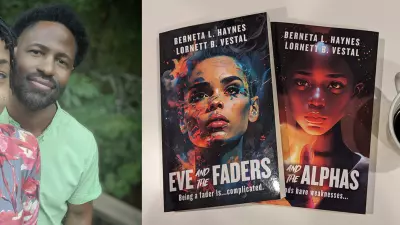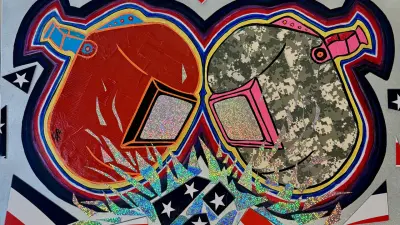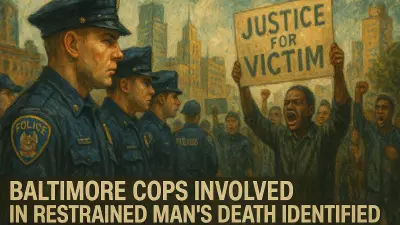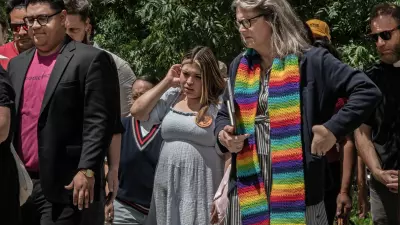One of the most common cliches around writing is that it is a solitary endeavor and that the scribe’s life is a lonely one.

However, spouses Berneta L. Haynes and Lornett Vestal have seemingly broken the lonely writer mold by collaborating on a pair of science fiction novels: Eve and the Faders and Aya and the Alphas, both of which explore challenges their heroes face while grappling with extraordinary powers.
We asked Berneta and Lornett, whose work previously appeared in Postindustrial, to explain their process and how they’re able to keep their squabbles about narrative from spilling over into their marriage.
“We had moments where our ideas about the stories clashed,” says Berneta. But she insists that collaborating with her husband has proven more rewarding than her first book, a solo outing titled Landrien Moriset about a Philadelphia attorney that draws on her own experiences, including her law profession.
Check out how they’re able to create a shared artistic vision without the drama you might expect.
Postindustrial: Writing a novel is hard enough. However, producing hundreds of pages with someone else seems near impossible. Since writing is often a solitary act, how do you, as a couple, resolve conflicts about plot and other creative differences?
Lornett: We had a lot of hard discussions about the characters and story arcs, too. Berneta wrote the first draft of Eve and Faders, and I took on the first draft of Aya and the Alphas. Then, we worked together to revise and rewrite both stories to ensure we created a consistent and complex world. It was challenging because we are different individuals with our own likes and dislikes. It involved a lot of compromises and discussions of ideas. We sometimes disagreed, but we reached a consensus quite a lot. We reshaped some things and did a lot of tweaks to make a comprehensive and compelling story spanning two novels. What helped us was the communication. And tons of rewrites. We both agreed that we wanted a beginning, middle, and end of these stories. We decided it would not become a never-ending book series that could continue.
Berneta: Before co-writing the Faders and Alphas series with Lornett, I’d published only one other novel — despite previously having written several novel-length stories that I never published. I’d always viewed writing as a solitary experience. So when I stumbled upon the idea of co-writing a two-book series, or duology, with Lornett, I went into it with excitement, yet extreme caution. I constantly reminded myself that this would be different and challenging. We had moments where our ideas about the stories clashed. During those moments, we often weighed the pros and cons of certain narrative or character choices. We talked through conflicts and always reached a compromise that put the integrity of the stories first.
To my surprise, co-writing was even more rewarding than writing a book solo! For the first time, I was writing and sharing early, unfinished drafts with a writing partner, and we were workshopping each other’s stories. It was eye-opening. Working with a writing partner gave me a deeper understanding of my writing style, strengths, and shortcomings.
Maybe more importantly, it highlighted the value of having a beta reader, or someone to read your drafts in the early stages. Having a second pair of eyes on your story while it’s in development can slow down the process certainly, but it can give you an early glimpse of how readers will respond to the story. That’s invaluable information for any writer.
Postindustrial: You’ve published two books together so far: Eve and the Faders and Aya and the Alphas, both of which focus on protagonists with extraordinary powers. How did you devise these stories, and what commentary do they make on present-day society?
Lornett: Ultimately, we forged a tale that started locally and ended globally. Both novels contain themes like finding yourself, love, loss, giving up power, and the importance of family. It’s good that we are both geeks who love video games, comic books, and movies, because these heavily influence the Fader and Alphas series. With my understanding of history and Berneta’s background in law, we wove into the story some geopolitical events that shape our world today. Eve and the Faders focuses on a down-on-her-luck public school teacher, who wants to improve her financial situation. Thrills and chaos ensue after she makes a couple of hasty decisions. Aya and the Alphas, on the other hand, centers on a teenage refugee who gets taken under the wing of the world’s most powerful fader and political leader. We took current events and trends, and then superimposed sci-fi and fantasy elements to present a world that’s not too different from our reality in terms of gender and racial issues, as well as neo-imperialism and colonialism.
Berneta: But we took those issues and turned them on their head, imagining a world where the powerless find the strength to fight back and upend the existing structure. Both stories focus on Black women and girls, a schoolteacher with superpowers in Eve and the Faders, and a superpowered young girl who becomes a refugee within her own country in Aya and the Alphas. My stories always share some common themes and elements: they center around a Black woman or girl, typically a queer or bisexual Black woman, learning to navigate a hostile world. The central Black woman or girl character eventually learns that the key to effectively navigating a hostile world is loving herself unconditionally and forgiving herself and others. This self-discovery never occurs in a vacuum, though. The characters only achieve this self-discovery and realize their full potential for love and forgiveness through their relationships with family.
To be clear, I’m not speaking only of biological or birth family. “Found family” — or the family that a person chooses — plays a critical role in my first novel, Landrien Moriset, and the Faders and Alphas series. Like my first novel, the Faders and Alphas series elevates found family to the level of birth family, emphasizing that sometimes the families we choose are healthier than those in which we’re born. For example, when Eve discovers others with extraordinary powers, she forms with them the family unit she never had, a family that loves her and enables her to become a powerful beacon of love for them and the world. She forms with them a family for whom she’s willing to sacrifice her life, if necessary. Aya comes from a strong birth family, but her family grows when she encounters others like her who have superpowers. Her love for this found family and her birth family becomes one love, and that love drives her to become more powerful than she ever imagined.
I’ve recognized these common themes upon rereading my novels and hearing from other readers. As a queer Black woman, I think I understand why these elements unintentionally surface in every story I write: to be queer, Black, and a woman in our world that’s hostile to all those identities requires me to daily practice self-love, forgiveness, and to recognize that family isn’t limited to the one into which we’re born. I think our true family is those people, whether or not related to us by biology, who increase our capacity to love and empower us to navigate a difficult world. It’s probably corny, but I believe our capacity to love is the greatest power we have in this world. The act of love — of self and others — is a necessary ingredient in any fight for justice and against structural oppression. Maybe I’ve read too much Bell Hooks, but this is how I view the world, and it comes through in the Faders and Alphas series.
Postindustrial: You currently reside in Atlanta. What’s the literary scene like there? Is there a network of fellow writers you rely on to give you honest, productive feedback on your work?
Lornett: We have a network of writers, but it’s more online and nationwide than locally in Atlanta. We’ve met some interesting and great writers here. But it was good that we had family and friends who were avid readers and helped shape our early drafts and rewrites.
Berneta: Something that always bothers me is the lack of a local writer’s network or community I have here in Atlanta. It’s not that there’s no writing community in Atlanta. When I moved to Atlanta in 2015 and published my first novel, I found and connected with a few local authors.
But every relationship fizzled out quickly, leaving me isolated yet again. I think I gave up somewhere along the line and resigned myself to not having a local writing network. That said, there are opportunities in Atlanta. I need to set aside my introversion and get involved more in those opportunities — like WriteClub in Atlanta, which hosts shows where writers engage in word combat, so to speak, on stage.
Currently, I satisfy my need for a writing community by running Waking Writer, a website where I interview writers from all over the world. Since I started the website in 2016, I have interviewed hundreds of writers and learned so much from them.
For now, Lornett and I typically rely on family members for honest early feedback, and we always hire an editor once we get deep into revision. I can’t emphasize enough how important it is to hire a good editor! No matter how much feedback you get from family members, other writers, or friends, there is no substitute for the feedback you’ll get from a good editor, especially an editor who has worked in big publishing houses.







